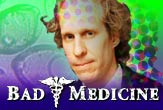Go Ahead, Drink Bacon Grease for Breakfast

Two very big and very expensive health studies were published in February to the glee of people everywhere who enjoy drinking bacon grease for breakfast. Maybe you saw the reprints in Cynicism Today. Both studies had a "cheesesteak does your body good" feel to them.
One study found that a low-fat diet didn't reduce the risk of cancer or heart attacks. The other found that taking calcium supplements did more harm than good. This was the kind of back-to-back, one-two punch my hefty coworker had been waiting to deliver to me; and as soon as he caught his breath from the 25-meter walk to my office, boy, did he let me have it.
The low-fat study was published in the Journal of the American Medical Association. Dr. Michael Thun, director of epidemiological research at the American Cancer Society, called it "the Rolls-Royce of studies." Perhaps he was talking about the sticker price, $415 million, which is astoundingly high for a health study. But lift up the hood on that baby, and you'll see the study as the engine of a Dodge Dart.
The main problem with the low-fat study was that it didn't study a low-fat diet. Oops. A low-fat diet recommends only 20 to 25 grams of fat per day, which would be about 10 to 15 percent of a 2,000-calorie diet. The subjects, all women, couldn't reach the modest study goal of 20 percent. They tried, but they ended up with 24 to 29 percent of their calories from fat. The researchers compared these ladies to a control group at the 35-percent fat level. And they found no difference? Amazing!
This was an eight-year study of women over 50, another gross limitation. Whether or not cancer or heart problems develop during this tiny window after 50 years of undocumented lifestyle is inconsequential. And the study didn't differentiate among fats now known to be healthy, such as those with omega-3 fatty acids, and unhealthy fats, such as the aforementioned bacon grease.
''These studies are revolutionary,'' said Dr. Jules Hirsch of Rockefeller University in a New York Times article. Well, they're revolutionary in the fact that we spent a lot of money and learned nothing about a low-fat diet. You may think a low-fat diet is bunk, and maybe it is, but this study provides no insight.
The calcium study, published in the New England Journal of Medicine, found that popping calcium tablets didn't prevent broken bones but instead led to kidney stones. What the calcium study reveals is that grand American philosophy: If something is good for you, then even more of it must be better.
Get the world’s most fascinating discoveries delivered straight to your inbox.
We see this with megadoses of vitamins, even though an excess of vitamin C can cause health problems. We see this with the recommendation to drink more tea because of antioxidants, with no regard for the fact that tannins in tea interfere with iron absorption.
Of course excess calcium causes kidney stones; kidney stones are made of calcium. The truth about osteoporosis, or weak bones, is that animal protein leaches calcium from bones. Because the American diet is high in animal protein, Americans require two to three times more calcium than other cultures do. The trick is to minimize leaching through exercise and less animal protein, and to start early in life.
Unfortunately the combined force of these two study results, widely published, has left many of us thinking that diet doesn't matter. If you think diet is inconsequential, than I offer this little venture: You do what you want, and I'll exercise and eat healthy foods in moderation. And we'll race to age 100. Ready? Go.
Christopher Wanjek is the author of the books “Bad Medicine” and “Food At Work.” Got a question about Bad Medicine? Email Wanjek. If it’s really bad, he just might answer it in a future column.
- The Biggest Popular Myths
- Scientists Developing 'Invisible Diet'
- Hang in There: The 25-Year Wait for Immortality
- Fat and Happy: Why Most People Don't Diet
- Marital Spats Raise Risk of Heart Attack
Editor's Note
LiveScience is pleased to introduce our readers this week to Christopher Wanjek, author of the books “Bad Medicine” and “Food At Work.” His column will appear each Tuesday, interjecting both humor and reality into the constant and often confusing stream of health and medical information.

Christopher Wanjek is a Live Science contributor and a health and science writer. He is the author of three science books: Spacefarers (2020), Food at Work (2005) and Bad Medicine (2003). His "Food at Work" book and project, concerning workers' health, safety and productivity, was commissioned by the U.N.'s International Labor Organization. For Live Science, Christopher covers public health, nutrition and biology, and he has written extensively for The Washington Post and Sky & Telescope among others, as well as for the NASA Goddard Space Flight Center, where he was a senior writer. Christopher holds a Master of Health degree from Harvard School of Public Health and a degree in journalism from Temple University.


